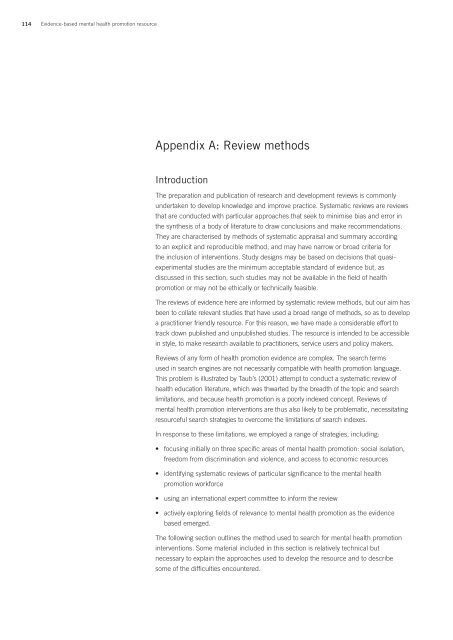Evidence-based mental health promotion resource - health.vic.gov.au
Evidence-based mental health promotion resource - health.vic.gov.au
Evidence-based mental health promotion resource - health.vic.gov.au
Create successful ePaper yourself
Turn your PDF publications into a flip-book with our unique Google optimized e-Paper software.
114 <strong>Evidence</strong>-<strong>based</strong> <strong>mental</strong> <strong>health</strong> <strong>promotion</strong> <strong>resource</strong>Appendix A: Review methodsIntroductionThe preparation and publication of research and development reviews is commonlyundertaken to develop knowledge and improve practice. Systematic reviews are reviewsthat are conducted with particular approaches that seek to minimise bias and error inthe synthesis of a body of literature to draw conclusions and make recommendations.They are characterised by methods of systematic appraisal and summary accordingto an explicit and reproducible method, and may have narrow or broad criteria forthe inclusion of interventions. Study designs may be <strong>based</strong> on decisions that quasiexperi<strong>mental</strong>studies are the minimum acceptable standard of evidence but, asdiscussed in this section, such studies may not be available in the field of <strong>health</strong><strong>promotion</strong> or may not be ethically or technically feasible.The reviews of evidence here are informed by systematic review methods, but our aim hasbeen to collate relevant studies that have used a broad range of methods, so as to developa practitioner friendly <strong>resource</strong>. For this reason, we have made a considerable effort totrack down published and unpublished studies. The <strong>resource</strong> is intended to be accessiblein style, to make research available to practitioners, ser<strong>vic</strong>e users and policy makers.Reviews of any form of <strong>health</strong> <strong>promotion</strong> evidence are complex. The search termsused in search engines are not necessarily compatible with <strong>health</strong> <strong>promotion</strong> language.This problem is illustrated by T<strong>au</strong>b’s (2001) attempt to conduct a systematic review of<strong>health</strong> education literature, which was thwarted by the breadth of the topic and searchlimitations, and bec<strong>au</strong>se <strong>health</strong> <strong>promotion</strong> is a poorly indexed concept. Reviews of<strong>mental</strong> <strong>health</strong> <strong>promotion</strong> interventions are thus also likely to be problematic, necessitating<strong>resource</strong>ful search strategies to overcome the limitations of search indexes.In response to these limitations, we employed a range of strategies, including:• focusing initially on three specific areas of <strong>mental</strong> <strong>health</strong> <strong>promotion</strong>: social isolation,freedom from discrimination and violence, and access to economic <strong>resource</strong>s• identifying systematic reviews of particular significance to the <strong>mental</strong> <strong>health</strong><strong>promotion</strong> workforce• using an international expert committee to inform the review• actively exploring fields of relevance to <strong>mental</strong> <strong>health</strong> <strong>promotion</strong> as the evidence<strong>based</strong> emerged.The following section outlines the method used to search for <strong>mental</strong> <strong>health</strong> <strong>promotion</strong>interventions. Some material included in this section is relatively technical butnecessary to explain the approaches used to develop the <strong>resource</strong> and to describesome of the difficulties encountered.



